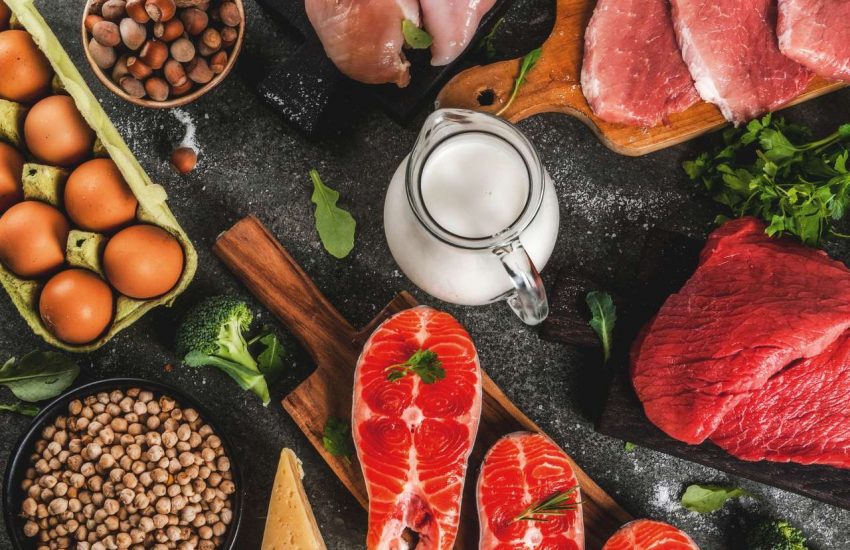ALL ABOUT MACRONUTRIENTS
Macronutrients, more commonly known as “macros”, are a group of nutrients that are stored in large quantities in your body. Essential for providing the body with the energy it needs to do everything from exercise to simple brain use (around 300 calories per day!).
There are three macronutrients: protein, carbohydrate, and fat. Some have a negative stigma surrounding them, but they all have a place in your diet.
PROTEIN
Providing 4 kcal per gram, protein is arguably the most important macronutrient. Proteins, commonly found in meat, dairy, beans, and soy products, are the building blocks of everything we do and are used to make muscles, organs, hair, and tiny molecules. within the body. Essentially, without protein, you wouldn’t exist!

MUSCLE GAIN
When following an active lifestyle, muscle tissue is constantly being broken down and rebuilt by muscle protein synthesis, a process essential for recovery and adaptation. To achieve muscle growth, muscle protein synthesis must exceed breakdown and protein intake can facilitate this.
It’s no secret that alongside weight training, more protein intake helps increase muscle size and strength, but the amount of protein needed is up for debate. As a general rule, an acceptable goal for those who wish to increase their muscle mass is between 1.7 and 2.2 g per kg of body weight.
These recommendations should also be followed for those who want to lose body fat while maintaining their current muscle mass. Research has shown that a high protein diet is essential to offset reductions in muscle mass often associated with dieting (Mettler et al., 2010).
HEALTH AND WEIGHT LOSS
Despite a common misconception, a high protein diet isn’t just for those who want to build muscle and certainly won’t make you fat.
In fact, protein plays an important role in losing weight and improving overall health!
Unlike muscle gain, where high intake relative to body mass is important, here we’re going to talk about the percentage of your diet that comes from protein sources.
Protein should make up 20-30% of your total calorie intake for several reasons.
First, as mentioned above, a high protein diet helps promote the development of lean muscle tissue, which in turn increases your metabolism and therefore your overall energy expenditure.
Foods high in protein can also increase your metabolism for a few hours after consumption, as protein requires more energy to digest than fat and carbohydrate. This is called the thermal effect of food.
CARBOHYDRATES
Carbohydrates, despite what is often reported, are not bad.
A common weight loss technique is to cut out carbohydrates completely from the diet, but this is often neither sustainable nor healthy. While ketogenic diets have potential benefits if done right, carbohydrates should be included in your diet, even if you want to lose weight!
Providing 4 kcal per gram and usually found in sugar, starch and fiber, carbohydrates play an important role in maintaining a healthy and balanced diet.
Once consumed, carbohydrates are converted into glucose before entering the bloodstream, and this blood glucose is the main source of fuel for your brain. So much so that hypoglycemia can reduce attention and cognitive function. Unused glucose is converted into glycogen, which is stored in the muscles and the liver.
Muscle glycogen is often the limiting factor for exercise that lasts longer than 90 minutes. So, for those of you who play team sports or exercise for long periods of time, eating a diet high in carbohydrates is essential and you should aim for an intake of 5-7g per kg of body weight.
For those looking to lose weight or just maintain a balanced diet, carbohydrates should make up about 50% of your total calorie intake.
Carbohydrates and processed sugars should be avoided in large amounts; However, most carbohydrates also have a wide range of health benefits. Whole wheat fruits, vegetables and starches are rich in vitamins and minerals, such as calcium, iron and B vitamins, which are essential for improving immune function. Research has also shown that a high-fiber diet is also associated with a lower risk of type 2 diabetes, as well as lower cholesterol.
As such, removing carbohydrates from your diet could lead to nutritional deficiencies, which would increase health risk.

Lipids
Like carbohydrates, fat is not the enemy!
Although fat provides 9kcal per gram, more than double that of protein and carbohydrates, the simple act of eating fat will not immediately be stored in your body as excess body fat!
In fact, a small amount of fat is essential for your health because it helps the body absorb several vitamins and minerals, including vitamins A, D and E.
Fat should make up 20% of your diet, but you should be wary of the types of fat you eat.
Usually divided into saturated and unsaturated fat, you should focus on consuming less than 20-30g of saturated fat such as: cheese, chocolate, fatty cuts of meat. This is because large amounts of saturated fat can raise low density lipoprotein cholesterol, thus increasing the risk of heart disease.
Instead, you need to replace saturated fatty acids with saturated fatty acids, which can increase high density lipoproteins (HDL), and then lower the risk of such diseases. These sources of fat include nuts, avocados, and oily fish. The omega 3s in these fatty fish have also been shown to potentially lower your blood pressure!
Summary
In summary, when applied correctly, all macronutrients play a role in maintaining a healthy and balanced diet. Some aspects of these nutrients can be changed to make it easier to meet your training goals, but none should be removed from your diet completely. For those looking to lose weight or improve their overall health, you should instead focus on increasing your total energy expenditure and reducing your total calorie intake, while maintaining your diet 50, 30 and 20% carbohydrates, proteins and fats.




